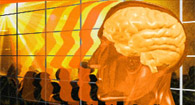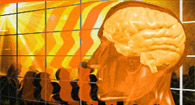Warning: Medical doctors strongly advise against the use/abuse of any recreational drugs.
You are in a club. A friend offers you a miserable amount of liquid in a glass. Looks like he let his vodka-on-the-rocks melt down and he's just trying to get rid of it. You down it out of courtesy - and it doesn't taste like anything you expected.

So your friend was being quite generous. You smile and contemplate the soapy feeling the hit left in your mouth. Nothing to do now but wait for the effects to kick in.
GHB has been abused by clubbers for over two decades, particularly the larger cities in the United States. It was developed in the 1960s as an anaesthetic, due to its ability to induce a relatively stable comatose state. However, its lack of adequate pain relief and tendency to induce seizures blocked its career down this pathway.
During the 1980s, GHB was widely available over-the-counter in health-food stores, purchased largely by bodybuilders for its ability to stimulate growth hormone release which aids in fat reduction and muscle building. In the last few years it has been gaining popularity as a "recreational" drug offering a pleasant, alcohol-like, hangover-free "high" with potent pro-sexual effects. It didn't take more than one gym bunny tottering around the free weights section in a giddy spin for all of them to realize its potential in a club setting.
You now feel a little light-headed. The club lighting looks a little blurry. You approach your friend, but barely manage to stumble over a bar stool that was invisible until just over a second ago. This seems so funny that you giggle to yourself. In a perfectly normal response to a first-time experience, you hear yourself think: "Am I going to die?"
GHB is broken down quickly by the human body and released as carbon dioxide in expired air, disappearing from the blood within four hours. Drug testing can thus return very frequently with a negative report. There have been deaths linked to the use of GHB, but since it is difficult to prove that GHB is the culprit in an autopsy, most of the reports are anecdotal. As such, deaths due to GHB may be vastly under-reported. Further complicating the picture, GHB is also a natural metabolite of the human body, and is produced even in death, when it can accumulate after breathing stops.
As with most substances, unpleasant and possibly dangerous side effects can be associated with excessive doses of GHB. A dose usually only about twice the amount required for relaxation or a pro-sexual effect can, as one user put it, "knock you out but fast."
Most users find that GHB induces a pleasant state of relaxation and tranquility. Frequent effects are placidity, sensuality, mild euphoria, and a tendency to verbalize. Anxieties and inhibitions tend to dissolve into a feeling of emotional warmth, well being and pleasant drowsiness. The effects of GHB can generally be felt within five to twenty minutes after ingestion. They usually last no more than one and a half to three hours. The effects of GHB are very dose-dependent. SMALL INCREASES IN THE AMOUNT INGESTED LEAD TO SIGNIFICANT INTENSIFICATION OF THE EFFECT. Higher levels feature greater giddiness, silliness, and interference with mobility and verbal coherence, and maybe even dizziness. Even higher doses usually induce sleep.
These effects are further amplified if mixed with alcohol or other depressants (such as sleeping pills or ketamine), which can result in nausea, violent vomiting, and even coma. Many club deaths are a result of such cocktails of drugs.

In January 1999, four teenage boys conspired to slip a "date rape" intoxicant into the Mountain Dew Samantha Reid and her friend were having at a party. Samantha died the next day, while her friend escaped with a brief coma. The substance was shown to be GHB. In February 2000, then-President Bill Clinton signed legislation toughening federal laws against possessing, making or distributing GHB in the USA, and the bill was named after Samantha Reid.
An added danger comes when many GHB preparations are actually "home recipes" found on the Internet, with no standardised method of preparation. This leads to a wide range of possible concentrations, and one batch of GHB can be 20 times more potent than another. With this enormous variability, it is highly risky to accept GHB from unknown sources.
GHB also poses a hazard on the roads. Many have fallen asleep at the wheel as a result of taking GHB. Some result in minor accidents, but in November 2000, Shanna West's car killed 54-year old Barbara Mercer on an American highway. She was described to have been swerving around, and crossing in and out of the grass. Even with a confession to be Driving Under the Influence (DUI) of GHB, no trace of the drug could be found in her bloodstream. Not even from a blood sample taken immediately after the accident. West was convicted for manslaughter due to culpable negligence, which carries a shorter sentence than manslaughter due to DUI.
With its unique properties, GHB still has legitimate uses in the treatment of narcolepsy (sleeping sickness) in some parts of Europe. Recent studies have suggested an anti-oxidant property of GHB, protecting against free radicals and hypoxic damage. This, and its apparent antidysrhythmic characteristic, has pushed GHB into the limelight as a potential treatment for myocardial infarction (commonly known as a heart attack), although this has yet to be confirmed by human trials.
Your head stops swimming, and the nausea gradually subsides. You start breathing more normally, and about an hour after that drink, your head clears up and you feel normal again. Gina has left just has abruptly as she arrived. That wasn't fun.
Misuse of GHB, GBL, and similar drugs can be deadly!
If you use GHB-type drugs, we strongly urge you to observe the following safety precautions:
- Never combine with alcohol or other CNS depressants. This combination has been deadly to a number of people.
- Seek medical attention for anyone who passes out from a GHB-type drug unless you can positively verify they are not under the influence of other drugs as described above.
- Never use "liquid" GHB unless you know the concentration, as it varies according to preparation. An overdose can cause anything from unrousable sleep (most commonly) to death (at least 50 confirmed from GHB alone), and the steep dose-response curve exacerbates the problem.
Warning: Medical doctors strongly advise against the use/abuse of any recreational drugs.











 Printable Version
Printable Version









Reader's Comments
Be the first to leave a comment on this page!
Please log in to use this feature.